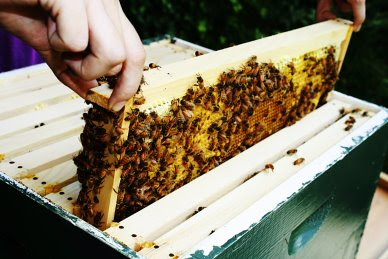My kid sis and future beekeeper Dana had alerted me to the possibility of supercedure cells in the hive, so I had to inspect. Supercedure cells look like wax peanut shells protruding from the comb; the colony is creating new virgin queens. The presence of supercedure cells in a hive typically means one of two things: they will replace the existing queen with the virgin queen by suffocating her in a tight ball of buzzing bees because they're in some vital way unhappy with her, or the existing queen and up to 3/4 or the colony are preparing to swarm, leaving behind progeny to continue the family line. This is unlikely, as swarm season has passed, although that hasn't stopped countless colonies from deserting their honey-filled homes to starve in a barren winter tree. Bees, like humans, can be self-destructive and don't always act in their actual self-interest.

I smoked the bees; just a puff here and there to confuse the guard bees on the hive landing and mysteriously soothe the colony. Yum.




Free to Be You... And Me, a 1970 film for kids, was a fan favorite among my sisters and I. Marlo Thomas, who is my shero, wrote songs and skits for public figures to sing and perform, about topics like love, sadness, sexuality, and freedom, to name a few. One features a really young Michael Jackson and Roberta Flack singing about growing up... do yourself a favor and watch it.
Anyway, Free to Be... You And Me might be worthy of an entire post, its so fantastic. But I digress...


One skit features a very fast princess named Atalanta, who doesn't want to marry just because that's what girls do, (you go girl!) to her father's cantankerous chagrin. Atalanta races all of the town's men, agreeing to either marry the winner or win and choose. It all comes down to worried Young John and Atalanta... after much suspense (and huffing and puffing,) they cross the finish line at the exact same moment.

The queen's mating flight is much like this skit. After days of training, lecherous drones dazedly passing the virgin queen in the hive, without lust or second thought, the queen releases a pheromone that says "I'm ready" and shoots into the air, emitting a shill chirp, until hundreds of drones from hives near and far race to catch up to her. Eventually, weak suitors fall behind until one single drone, the strongest, remains.
In Free To Be... You And Me, instead of joining together in union, the princess travels the world on her horse and her suitor becomes a great scientist- and the story ends with the possibility of a love reconnection after they'd followed their respective dreams, but assures the viewer that another ending wouldn't make the story any less significant.
In the bee world, the queen and the winning drone do join in union. In fact, their union is so strong that the drone's sex organs are ripped off to remain in the queen's body as he falls to earth with intestines dangling from serrated abdomen. When she returns to the hive, her attendants remove the drone's bottom-half from the queen's bottom-half. She'll get her kicks for 2-3 days, return to the hive, and never mate again.

In Free To Be... You And Me, Alan Alda and Marlo Thomas narrate. There is no narrator in the bee's story, but if there were, it would be Werner Herzog. He would contrast the queen's sexual burden with the workers' sexual disenfranchisement. He would continue to use the word "increezingly." He would empathize with queen and drone, slaves to their hard working sisters and daughters.
Atalanta is only a princess, but she enjoys the right to choose, a right that separates us from insects and other species that are bound to the ball-and-chain of instinct and dragged, or perhaps exalted, through life by a mysterious plan devised by Ma Nature that humans simply cannot decipher. The queen bee is a queen in name only, her nomenclature more parody than analogy.

Princess Atalanta is sovereign, and her suitors probably envy her power or are delighted by the idea of her. Queen bees are peons, held captive by their base ability to procreate. They are owned exclusively by their daughters, who nevertheless care for their mother meticulously. (Did anyone ever read Lois Lowry's The Giver in high school? Think of the birthmothers: held in low opinion, yet essential and thus pampered.)

My queens, Catra and Shera, look big and healthy, but one of them may be a marked woman. Although both of them are actually marked with a green dot, only Shera seems to be potentially marked for assassination. I cannot determine whether or not what I see are supercedure cells. If they are, I hope they do not swarm. It may sound cruel, but I hope they're planning on assassinating Shera. Not because I like a good cat fight, because I don't, and happen to despise the phrase "cat fight" at that, but because its a natural phenomenon that requires no beekeeper action and actually serves the self-interest of the colony. Otherwise, I might have to climb a telephone pole with a bee vacuum, and I'm not feeling too dexterous.
Do you think she knows??






No comments:
Post a Comment